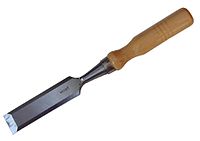chisel
English
[edit]Pronunciation
[edit]Etymology 1
[edit]From Middle English chisel, chesel, from Old Northern French chisel, cisel, from cisoir (with a change in suffix), from Late Latin cīsōrium (“cutting tool”), from Latin caedere (“cut”).
Noun
[edit]chisel (plural chisels)
- A cutting tool used to remove parts of stone, wood or metal by pushing or pounding the back when the sharp edge is against the material. It consists of a slim, oblong block of metal with a sharp wedge or bevel formed on one end and sometimes a handle at the other end.
Derived terms
[edit]Translations
[edit]
|
See also
[edit]Verb
[edit]chisel (third-person singular simple present chisels, present participle chiseling or chiselling, simple past and past participle chiseled or chiselled)
- (intransitive) To use a chisel.
- (transitive) To work something with a chisel.
- She chiselled a sculpture out of the block of wood.
- (transitive, dated) To barge in on (something); to intrude on (something).
- (transitive, intransitive, informal) To cheat; to obtain something from (someone) by cheating.
- (transitive, figurative) To make small changes to (something), resulting in change over time.
- Laws that protect the environment are being chiseled away.
- (transitive, dated) To beg or pressure somebody into giving up (something).
- He's managed to chisel a couple dollars from somewhere.
- She can always chisel whatever she needs from her father.
Usage notes
[edit]chiselling and chiselled are more common in the UK while chiseling and chiseled are more common in the US.
Derived terms
[edit]Translations
[edit]
|
Etymology 2
[edit]From Middle English chisel, chesil, from Old English ċeosol, ċeosel, ċysel, ċisel, ċisil (“gravel, sand”), from Proto-West Germanic *kesul (“small stone, pebble”). See also chessom.
Alternative forms
[edit]Noun
[edit]chisel (usually uncountable, plural chisels)
Related terms
[edit]Further reading
[edit]- “chisel”, in Webster’s Revised Unabridged Dictionary, Springfield, Mass.: G. & C. Merriam, 1913, →OCLC.
- “chisel”, in The Century Dictionary […], New York, N.Y.: The Century Co., 1911, →OCLC.
- “chisel”, in OneLook Dictionary Search.
Anagrams
[edit]Middle English
[edit]Alternative forms
[edit]Etymology
[edit]From Anglo-Norman chisel.
Pronunciation
[edit]Noun
[edit]chisel (plural chisels)
- Any of several cutting tools used by stone masons.
Descendants
[edit]References
[edit]- “chisē̆l, n.”, in MED Online, Ann Arbor, Mich.: University of Michigan, 2007.
Old French
[edit]Noun
[edit]chisel oblique singular, m (oblique plural chiseaus or chiseax or chisiaus or chisiax or chisels, nominative singular chiseaus or chiseax or chisiaus or chisiax or chisels, nominative plural chisel)
- (Old Northern French) Alternative form of cisel
- English 2-syllable words
- English terms with IPA pronunciation
- English terms with audio pronunciation
- Rhymes:English/ɪzəl
- Rhymes:English/ɪzəl/2 syllables
- English terms derived from Proto-Indo-European
- English terms derived from the Proto-Indo-European root *kh₂eyd-
- English terms inherited from Middle English
- English terms derived from Middle English
- English terms derived from Old Northern French
- English terms derived from Late Latin
- English terms derived from Latin
- English lemmas
- English nouns
- English countable nouns
- English verbs
- English intransitive verbs
- English transitive verbs
- English terms with usage examples
- English dated terms
- English informal terms
- English terms inherited from Old English
- English terms derived from Old English
- English terms inherited from Proto-West Germanic
- English terms derived from Proto-West Germanic
- English uncountable nouns
- en:Tools
- en:Carpentry
- Middle English terms borrowed from Anglo-Norman
- Middle English terms derived from Anglo-Norman
- Middle English terms with IPA pronunciation
- Middle English lemmas
- Middle English nouns
- Old French lemmas
- Old French nouns
- Old French masculine nouns
- Old Northern French


